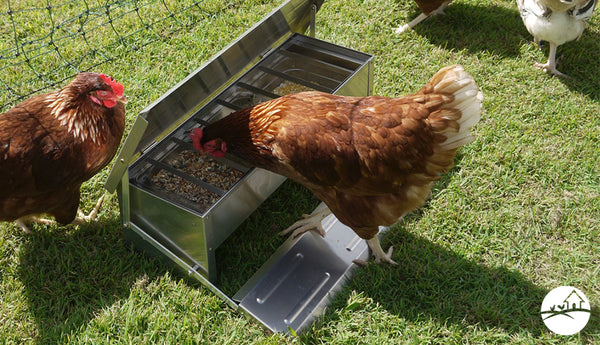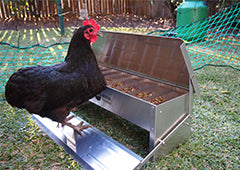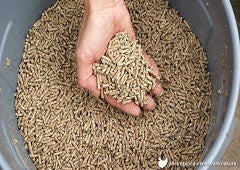Sometimes it can feel like the bag of chicken feed is always half empty. Most chicken feed is reasonably priced but the frustration of wasted feed can be a genuine pain on your mind and your budget. There are of course a number of clever techniques any savvy chicken carer can employ to be sure that they make every morsel and grain of their chicken feed count. Here are some sure fire ways to make sure that you and your chickens save a few extra dollars at the checkout.
Chicken feed should live in the right feeder
Many of us have romantic notions of stepping out into our backyard surrounded by rolling hills and scattering chicken feed onto the grass, as the flock pecks and coos at your feet, devouring every morsel of food sweetly. Though this is a very pretty picture of chicken life- it isn’t necessarily accurate.
Serving up the chicken feed will be a magical moment you’ll experience every day if you own chickens but please don’t scatter the mixture onto the ground; a feeder is essential for any aspiring chicken owner. In essence, a feeder is the most cost effective way to allocate your chicken feed to the flock. Some owners work on the formula of giving them enough chicken feed to last the flock thirty minutes, twice a day, which works out to be once in the morning and once in the afternoon. Other chicken owners prefer to ensure that their chooks have chicken feed available to them day and night. There is more evidence to suggest that it is important for chooks to have chicken feed available to them twenty-four seven, otherwise they might get up to other forms of misbehaviour. Poultry will rarely overindulge on their chicken feed, however, the longer excess feed remains in the coop, the more likely it is to go to waste through carelessness. So, perhaps the wisdom is to ensure that your girls always have food available to them, but don’t put all your chicken feed into one feeder- so to speak.
Another important thing to note about feeders is that ideally they should be suspended within the coop itself. To explain, in order to prevent unnecessary chicken feed spills, most owners will suspend the feeder with wire or string, so that the chickens will be unable to knock the vessel over with their feet. This is easily achieved if you have a chicken coop with a galvanised wire roof, like The Penthouse, which will make setting up your feeder that little bit easier. Make sure you suspend the feeder at the right height, otherwise your chooks won’t be able to access their chicken feed and you’ll have an entirely different problem on your hands- hungry, hungry chickens!
Check out a full range of other types of chicken feeders here.
Don’t be a mash potato- give your chicks pellets
The mash versus pellet debate has been going on in the poultry community for longer than most of us can care to remember. Both sides have their reasons, however, when the topic purely concerns the prevention of wastefulness- pellets win every time. Pellets are very small and compact rolls of nutrition, which is easily identifiable for both chickens and their owners. The benefits of pellet based chicken feed is that the product is more manageable than mash. Mash is a powdery type chicken feed that is designed to be consumed over a longer period of time. Given it’s texture, mash is more likely to go astray, be blown away or may be rendered inedible if it were to rain. Pellets are more durable and easier to serve up. In the event your cheeky chooks knock a feeder full of pellets over, it’s more likely you’ll be able to salvage the chicken feed than if they were to knock over a container of mash.
Give your chicks the right kind of treats
There are a lot of common types of kitchen scraps and treats that your chooks will happily lap up if you remember to give it to them. Things like oatmeal, yoghurt, pumpkin, berries and leafy greens will be the perfect treat for your flock. For example, if you have some leftover green salad from a dinner party, instead of throwing it in the bin, consider tossing it into the coop- your chickens will be truly grateful. Not only are you decreasing your own household waste, you are in turn reducing the amount of chicken feed you use. This is all pretty simple stuff but if you are smart, attentive and conscientious, you will find so many small ways to make a big difference when it comes to your chicken feed budget.
Bored chickens will play with their food
Your chooks aren’t birdbrains- they have a lot of energy that you need to carefully redirect, otherwise they’ll get up to more destructive behaviours, like flipping the feeder over, feather picking or scattering their pellets into the wind. There are a lot of ways you can minimise the threat of your chickens acting like bored and destructive divas. Such as getting your girls a chicken swing, making a fruit pinata for them to peck at or even putting a mirror in the cage so they can gaze at themselves all day long. This may seem tangential however if you’re flock is preoccupied they are less likely to get up to mischief, which will only cost you money in the long run.
There are a whole host of other avenues you can explore when it comes to saving money on chicken feed, such as making your own, buying in bulk and so forth. Ultimately though the best way to ensure that you get the most from your chicken feed is to be conscientious, always use a chicken feeder and be mindful of the tantrums your chickens might throw if they’re bored. Make sure your chicks have plenty of safe room to play, like the Penthouse, Mansion and Mansion Run, otherwise your chicks might start to accidentally peck away at your extra cash.
We want to do an eggcellent job when caring for our feathered friends. From diets to disease prevention, make sure that you've got the knowledge you need to raise happy, healthy chooks. Did you know 67% of chicken keepers surveyed experienced a chicken health or behaviour issue in the first 12 months that they didn’t know how to handle?
But don’t worry! Our feathered friends over at Chickenpedia have created a Chicken Healthcare Course. It is a comprehensive online course that covers everything you need, including what to look for in an unhealthy chicken and how to support your egg-laying hens to optimal health. All of their courses are really well structured and filled with vital information, which is why I highly recommend them to all of my readers! From raising baby chicks to feeding to behavior, you’ll find valuable information that’ll give you the knowledge and confidence to successfully look after your chickens.
Check out Chickenpedia today. As a member, you will also get access to the ALL of their chicken courses!



















